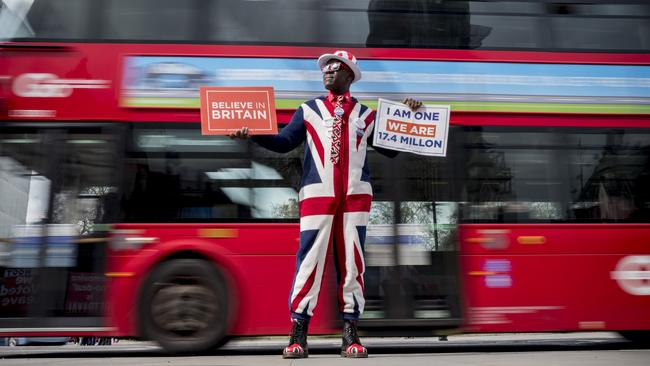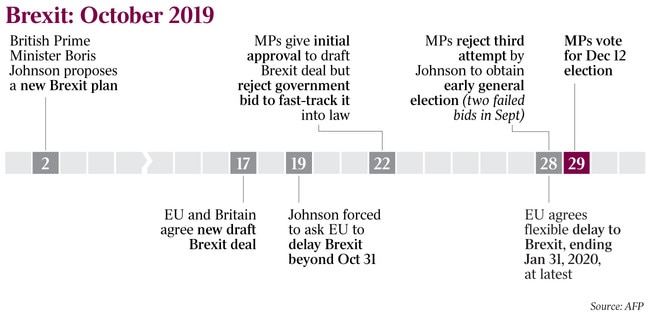All I want for Christmas is a Brexit resolution
Britons are facing up to the cold, grey light of a winter election campaign.

So, Britain’s having a general election in prime panto season. Thursday, December 12, means polling stations bumping elbows and butting heads in village halls across the country with Buttons, Mother Goose and sundry pantomime horses.
Shouty ex-Speaker John Bercow — now he can no longer impose himself on the Commons — should consider taking a star turn as Widow Twankey, or rather “Widow Wanky”.
Panto may be high-spirited fun and Bercow a laugh-riot but December in Blighty is cold and dark. It means party activists canvassing at night while the sun will set on polling day in Birmingham — roughly the middle of the country — at 3.52pm.
Billed as the most significant election since 1945’s Labour landslide, the outcome will determine not only the form Brexit takes, but whether it happens at all.
READ MORE: Greg Sheridan: This is truly one for the ages | Inquirer: Aussie style in Johnson’s election campaign
The poll will have 150 Labour MPs and three Liberal Democrats campaigning in Leave seats and 80 Conservatives campaigning in Remain seats. It also pits genuinely different political visions against each other in a way not seen in these islands for decades: the days of Blair-Cameron identikit politicians with technocratic policies are over.
British voters are increasingly “up for grabs”, shopping around the political marketplace like first-home buyers. According to the British Election Study, 35-45 per cent of all voters switched parties at each of the last two elections. “Rusted-on” tribal voters — “my family vote Tory so I’ll vote Tory” — while not an endangered species are becoming harder to find.
Ironically, ever since Britain voted to leave the EU our politics have started to look more European. What was once one of the world’s most stable two-party systems has imploded, and it’s now a four-party race.
Since 2016, a succession of polls has shown most voters consider their identity as Leave or Remain far more important than their party identity. Yet, in the 2017 general election, this phenomenon seemed not to matter: the two majors got their highest joint share of the vote for many years.
But this flattered to deceive. Both saw the composition of their vote change. Labour under Jeremy Corbyn did better among middle-class voters than Tony Blair did in 1997, advancing significantly in the south. Meanwhile, the Conservatives got their highest share of the working-class vote since the 1960s and gained ground in the North and Midlands.
Survey after survey shows a majority of the British population agreeing with the statement “parliament does not represent or listen to people like me”.
British political historian Stephen Davies observes that one of the worst things about membership of the EU is that its rules on trade, freedom of movement and state aid make both socialism and national populism politically impossible.
“It’s not healthy,” he points out, “for a democratic society when the views and feelings of a large part of the electorate do not find expression.” In that sense, the 2016 referendum result was a catalyst for people to cast around for political alternatives.
That said, the parties themselves are also changing. Their leaderships have come to appreciate the extent to which the divisions in the House of Commons and the labels “Conservative” and “Labour” no longer represent divisions present in the electorate.
The Conservatives, in particular, are engaging in one of their periodic internal reorganisations where they keep the name but become a different party. This last happened 100 years ago, when it stopped being an aristocratic and landed party and became a party of business and commerce.
If parliament did reflect the country and we had an electoral system something like that in Australia’s Senate, there would be four parties with strong geographical bases: Radical Remainia, Liberal Remainia, Brexitshire and Leaverstan.

This makes predicting the result incredibly difficult (you didn’t think I was going to try, six weeks out, did you?) because what’s happening now is guaranteed to turn safe seats held by all parties into marginals and marginals into safe seats, in a completely unpredictable way.
Radical Remainia is made up of younger, university-educated voters. They live in London, major metropolitan areas and university towns. They have a strong foothold in Scotland. They are concerned about the environment (even if they don’t personally join Extinction Rebellion protests), often engage in what is called “identity politics”, and favour both immigration and significant economic redistribution. They are consistently and almost uniformly anti-war but often combine this with an active dislike of their own country.
Liberal Remainia voters live in southeast England and the M4 corridor, with a sprinkling in Scotland and Northern Ireland. They are affluent, professional, university-educated, and employed in sectors with significant international exposure. They are more pro-market and fiscally conservative than the inhabitants of Radical Remainia and not particularly committed to wealth redistribution. They tend to favour “humanitarian intervention” and do not see eye-to-eye with Radical Remainia on this. Both Remainia groups are, of course, “cosmopolitans” or “globalists” (to use the political argot developed in the wake of the 2016 referendum and the election of Donald Trump).
Brexitshire voters also live in southeast England and the M4 corridor, with a dusting elsewhere in Wales and the West Country. They are demographically similar to Liberal Remainia voters, although there is a greater preponderance among them of private sector employment and post-school qualifications in STEM or skilled trades rather than humanities or social sciences. They are pro-market, uninterested in economic redistribution, tend not to be bothered by immigration, but are strongly patriotic. Their nationalism — while supportive of HM’s armed forces — does not extend to “vanity wars” such as Iraq, Libya or Syria, on the basis that intervening over there leads to unwanted refugees over here.
Finally, we come to Leaverstan. These are working-class voters in small towns and older industrial regions in the north, Midlands and Wales. They also dominate in coastal areas. They are the least likely of any of the four groups to be university-educated. They are opposed to immigration, intensely patriotic in much the same way as those in Brexitshire while supporting significant economic redistribution. They compete with Radical Remainia when it comes to professing undying love for the National Health Service.
Both Brexitshire and Leaverstan fall on the “nationalist” side of the post-Trump political divide, in opposition to cosmopolitanism or globalism.
The challenge this four-way division presents to Labour and the Tories is obvious. Labour’s electorate is now split into Radical Remainia and Leaverstan, while pre-Boris Tories were stuck with trying to combine Brexitshire and Liberal Remainia. Labour is still playing both ends against the middle, attempting to appeal to both Leaverstan and Radical Remainia and so hold its electoral coalition together.
This is why its Brexit policy is utterly bonkers: negotiate a new deal and then (maybe) campaign to reject it in a second referendum. As should be reasonably obvious, this fudge is unsustainable and Corbyn is already moving his campaign away from Brexit and on to redistributive economics in the hope Radical Remainia and Leaverstan don’t notice.
The Conservatives, by contrast, have made a decision: Boris’s Svengali-like adviser, Dominic Cummings, has made the Tories “the Party of Leave”. He has done so in order to repel the threat from Nigel Farage’s Brexit Party and ensure that the Conservative Party retains custody of Britain’s political right. On that point, it’s worth noting the Tories have kept some Liberal Remainians in the tent thanks to winkling a deal out of the EU at the last minute. Bits of that grouping — while still bloody annoyed that Leave won in 2016 — were willing to accept the result as long as a reasonable deal was secured and No Deal averted.
That said, some of the most polarising behaviour engaged in by anyone on either side has come from upper-middle-class Liberal Remainiacs — often former Conservatives plus a goodly smattering of Labour’s politically homeless Blairites — who were never going to be persuaded by any deal, no matter how generous. A significant number really do think northern and Midlands Leaverstan only voted Leave because they’re the sorts of places pigeons fly upside-down thanks to nothing being worth shitting on. An even larger number pretends that socially and economically similar Brexitshire doesn’t exist.
When Liberal Remainia’s signature organisation — the “People’s Vote” campaign — collapsed in acrimony and mutual resentment on Monday, the Great British Public was treated to the spectacle of wealthy metropolitan poshos and their public relations hirelings locking each other out of various fancy London offices, serving writs on each other, shouting, and generally channelling the People’s Front of Judea.
Foreshadowing the December general election, People’s Vote decided to put on a pantomime. Watching it was to know true joy, like seeing Jeremy Clarkson get his Aston Martin clamped.
Given the country’s political divisions, if nothing else there will be a great seat sort with many constituencies changing hands. The LibDems will gain seats from the Tories. Labour will gain seats from the LibDems. The Tories will gain seats from Labour.
The Tories also hope the Brexit Party in combination with First Past The Post doesn’t lead to yet another hung parliament. The Scottish Nationalists, meanwhile, are a good bet to win every seat in Scotland.
The end will only come with a majority government on either side that can impress its will for long enough that a reversal of its policies after its eventual defeat would be impracticable in the medium term (like Margaret Thatcher managed to achieve with economic policy, for example). For that to happen, someone has to win a majority on December 12.
Helen Dale won the Miles Franklin Award for her first novel, The Hand that Signed the Paper, and read law at Oxford. Her most recent novel, Kingdom of the Wicked, was shortlisted for the Prometheus Prize. She lives in London.



To join the conversation, please log in. Don't have an account? Register
Join the conversation, you are commenting as Logout